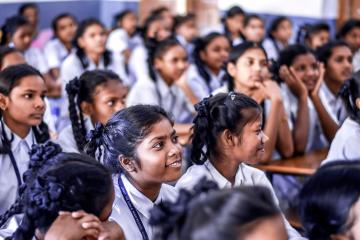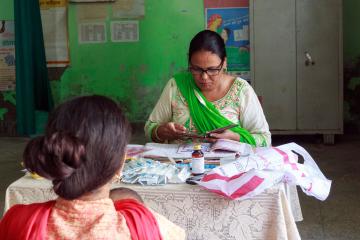
Motivating new education research and scale for COVID-19 recovery

The COVID-19 pandemic has left an unprecedented 1.6 billion children and youth out of school, affecting approximately 85 percent of the world’s student population.
Even before the pandemic, 258 million children and youth of primary- and secondary-school age were out of school, and low levels of school quality meant that even students attending school regularly were struggling to achieve basic literacy and numeracy. Based on current projections, the share of children below minimum proficiency levels is expected to increase by 25 percent.
In response to this urgent need, J-PAL is launching a one-time Education Research and Scale for COVID-19 Recovery innovation competition to fund randomized evaluations and scale-ups of strategies to improve access, quality, equity, and relevance of pre-primary, primary, and post-primary education in response to the ongoing COVID crisis.
The competition is jointly co-hosted by J-PAL’s Post-Primary Education (PPE) Initiative and Innovation in Government (IGI) Initiative, and generously supported by the Douglas B. Marshall, Jr. Family Foundation and Echidna Giving.
How the pandemic is affecting children’s learning
Beyond the hundreds of millions of children now out of school, educational inequities are further exacerbating learning loss, especially for the most vulnerable children. While many countries have adopted online and remote learning approaches during school closures, many millions of children are without access to technology, and thus education.
With differential access to remote learning and home conditions further widening learning gaps among students, children and youth from disadvantaged backgrounds are at high risk of being left further behind.
Meanwhile, as schools slowly begin to reopen, girls and other vulnerable groups are at high risk of not returning to school. School systems must therefore both encourage school re-entry for as many students as possible, while ensuring equitable learning for all.
Previous research shows that a central barrier to learning is that children enter classrooms at very different levels, many unable to keep up with curriculum. As the COVID crisis is expected to widen the gap between children with access to learning resources out of school and those without, teachers are likely to return to classes with an even wider range of students’ abilities in their classrooms, making their jobs even more difficult, and risking even more children being left behind.
The new innovation competition: Education Research and Scale for COVID-19 Recovery
During this grant competition, J-PAL expects to award funding to affiliated researchers across four types of proposals:
- Full research projects (awards up to $200,000);
- Pilot research projects (awards up to $75,000), including descriptive work (awards up to $25,000);
- Exploratory work for proposal development (awards up to $10,000); and
- Scale-up projects with government partners (awards up to $200,000).
Funded research will focus on studies that address key questions on how best to mitigate learning loss as a result of school closures, and how to continue and motivate student learning across all grade levels during the ongoing COVID crisis.
For research projects, we are prioritizing the following topics:
- Innovations in education technology designed to make remote learning more equitable and accessible during school closures;
- Policies to reduce the gender gaps in school participation and learning both during and after the COVID crisis; and
- The use of remedial education to support disadvantaged students, such as girls and children with physical/cognitive disabilities, upon re-entry into schools.
For scale-up projects, we are prioritizing partnerships that adapt, pilot, or scale evidence-informed innovations in education and explore one or more of the following cross-cutting themes:
- Technology- and data-enabled program delivery and monitoring;
- Implementation science; and
- Cost analysis.
J-PAL affiliates, postdocs, and invited researchers can learn more about eligibility and the application process on the PPE and IGI web pages.
As studies and scaling efforts commence and begin to generate results, we will publish new posts to the J-PAL blog and release new evaluation summaries. To stay up to date on this new research, sign up for the J-PAL eNews and select “Education” as an interest area.
Related Content

Reflections from seven years of research in J-PAL’s Post-Primary Education Initiative

Increasing the use of data and evidence in real-world policy: Stories from J-PAL’s Government Partnership Initiative


